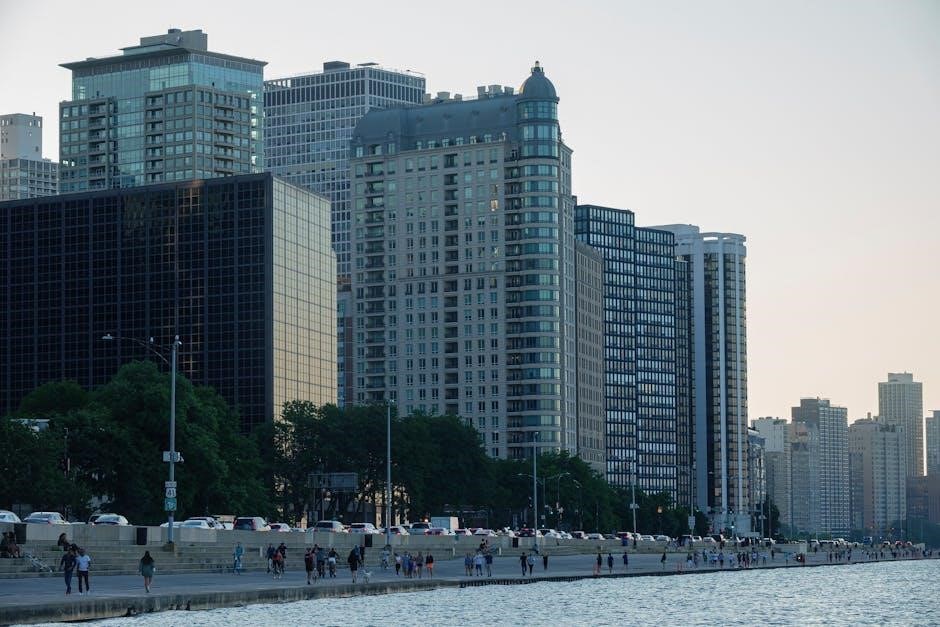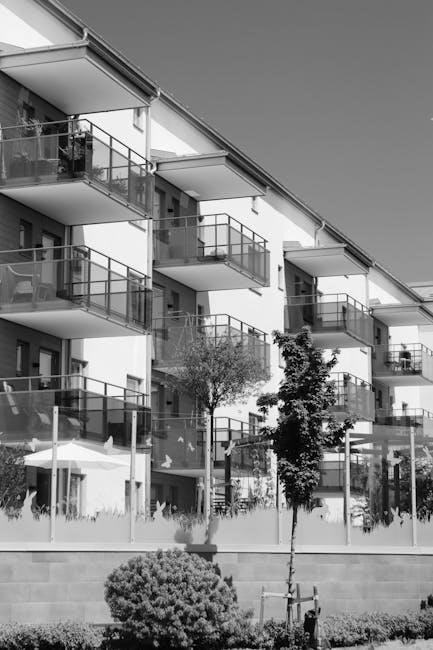2023 Chicago Residential Lease Agreement: Overview

The 2023 Chicago Residential Lease Agreement is a legally binding contract between landlords and tenants, outlining rental terms, responsibilities, and rights. It ensures compliance with local ordinances and provides customizable options for specific rental situations in Chicago, Illinois.
The Chicago Residential Lease Agreement is a legally binding contract between a landlord and tenant, detailing the terms and conditions of renting a property in Chicago. It is specifically designed to comply with the Chicago Residential Landlord and Tenant Ordinance (CRLTO), ensuring both parties understand their rights and responsibilities. The lease outlines the rental term, monthly rent, security deposit, and rules for maintaining the property. It also covers tenant responsibilities, such as timely payments and property upkeep, while specifying landlord obligations, including maintenance and access rights. The document is customizable, with fillable fields for lease duration, rent amounts, and other specific terms. Tenants and landlords must sign the agreement, which can now be edited and executed electronically for convenience. The lease is updated annually to reflect changes in local laws, ensuring compliance and fairness for all parties involved.
Key Changes in the 2023 Chicago Residential Lease
The 2023 Chicago Residential Lease Agreement introduces several important updates to ensure compliance with evolving local laws and tenant rights. One key change is the inclusion of fillable fields and customizable options, allowing landlords to tailor the agreement to specific rental situations. The lease now explicitly outlines tenant responsibilities, such as maintaining the property and allowing landlord access with proper notice. Additionally, it clarifies landlord obligations, including timely repairs and adherence to the Chicago Residential Landlord and Tenant Ordinance (CRLTO). The agreement also addresses electronic execution, enabling landlords and tenants to edit, sign, and manage the lease digitally. These changes aim to enhance transparency, fairness, and convenience for both parties, while ensuring all terms align with current legal requirements in Chicago.
Structure of the 2023 Chicago Residential Lease

The 2023 Chicago Residential Lease Agreement is structured to include essential sections like rental terms, tenant responsibilities, and landlord obligations. It features fillable fields for customization.
Essential Sections of the Lease Agreement
The 2023 Chicago Residential Lease Agreement includes essential sections such as tenant and landlord information, rental term details, monthly rent specifics, and lease commencement dates. These sections ensure clarity and compliance with local ordinances. The lease also outlines tenant responsibilities, including maintenance and access permissions, while detailing landlord obligations like repairs and notifications. Additional sections cover lease termination requirements, renewal policies, and legal remedies for both parties. These components are designed to protect both tenants and landlords, ensuring a fair and transparent rental agreement. The structure is comprehensive, covering all necessary aspects to avoid disputes and ensure smooth tenancy. Properly filling out these sections is crucial for enforceability under Chicago’s Residential Landlord and Tenant Ordinance. This ensures that all parties are aware of their rights and responsibilities from the start. The lease also includes provisions for electronic execution, making it adaptable to modern practices. Overall, these sections provide a solid foundation for a legally binding and mutually beneficial agreement.
Fillable Fields and Customizable Options
The 2023 Chicago Residential Lease Agreement offers fillable fields and customizable options to cater to specific rental situations. Users can easily insert property details, rental terms, and payment information. The lease allows for electronic editing, enabling landlords to type text, complete fillable fields, and even insert images or redact sensitive data. Customizable sections accommodate unique agreements, such as pet policies or furniture inclusion. These features ensure the lease is tailored to individual needs while maintaining compliance with Chicago’s legal requirements. The ability to highlight or add comments facilitates clear communication between parties. Additionally, the lease supports online signatures, streamlining the execution process. These customizable options make the document versatile and user-friendly, adapting to various rental scenarios in Chicago. This flexibility ensures that the lease remains both legally robust and practically suited for different tenancy arrangements.
Legal Compliance and Tenant Rights
The 2023 Chicago Residential Lease ensures compliance with the Residential Landlord and Tenant Ordinance, protecting tenant rights through clear terms on maintenance, access, and termination policies.
Chicago Residential Landlord and Tenant Ordinance
The Chicago Residential Landlord and Tenant Ordinance (CRLTO) governs rental agreements, ensuring tenants’ rights are protected. It mandates landlords to maintain habitable conditions, provide written leases, and allow tenants to remedy violations. The ordinance also outlines eviction procedures, requiring landlords to give proper notice and prohibiting unlawful evictions. Tenants are entitled to a summary of the ordinance attached to their lease, ensuring transparency. Compliance with CRLTO is non-negotiable, and violations can result in legal consequences for landlords. This framework fosters a balanced relationship between landlords and tenants, promoting fair housing practices in Chicago.
Tenant Responsibilities and Landlord Obligations

Tenant Responsibilities and Landlord Obligations
Tenants are required to maintain the rental property, adhere to lease terms, and pay rent timely. They must permit landlords access for repairs and inspections with proper notice. Tenants are also responsible for reporting maintenance issues promptly; Conversely, landlords must ensure the property is habitable, addressing repairs and maintaining essential services like heat and water. Landlords are obligated to provide a written lease, disclose specific information, and comply with the Chicago Residential Landlord and Tenant Ordinance. They must also return security deposits within 45 days of lease termination, minus any lawful deductions. Both parties must fulfill their duties to maintain a lawful and harmonious rental relationship, as outlined in the 2023 Chicago Residential Lease Agreement.

Lease Duration and Renewal
The 2023 Chicago Residential Lease Agreement specifies maximum lease terms and renewal policies, ensuring clarity for both landlords and tenants regarding rental duration and termination requirements.
Maximum Term for Residential Leases in Chicago

The 2023 Chicago Residential Lease Agreement sets a maximum term for residential leases, ensuring landlords and tenants have clear guidelines on lease duration. The lease form includes provisions for fixed-term agreements, typically ranging from one to a maximum of three years, as specified by the Chicago Residential Landlord and Tenant Ordinance. This structure provides stability for tenants while allowing landlords flexibility in managing their properties. The lease term is explicitly outlined in the agreement, preventing indefinite or overly lengthy commitments. Tenants are protected from abrupt changes, and landlords can plan accordingly. Compliance with local ordinances ensures that all parties adhere to legal standards, maintaining a balanced rental relationship. The maximum term provision is a key aspect of the lease agreement, fostering predictable and fair rental arrangements in Chicago.

Termination and Renewal Policies
The 2023 Chicago Residential Lease Agreement outlines specific termination and renewal policies to protect both landlords and tenants. For month-to-month tenancies, landlords or tenants must provide at least 30 days’ notice to terminate the agreement. For fixed-term leases, termination is generally not permitted unless both parties agree or a breach of contract occurs. Renewal policies allow landlords to decline lease renewal under certain conditions, provided they follow legal guidelines. Tenants are protected from retaliatory actions, ensuring fair treatment. The lease also specifies rules for rent increases, which cannot be imposed if the tenant has lived in the unit for less than six months. These policies aim to balance flexibility for landlords with stability for tenants, adhering to the Chicago Residential Landlord and Tenant Ordinance.

Electronic Execution and Management
The 2023 Chicago Residential Lease supports electronic execution, allowing landlords and tenants to edit, sign, and manage the agreement online efficiently, ensuring convenience and legal compliance.

How to Edit and Sign the Lease Agreement Online
Modern digital tools allow landlords and tenants to seamlessly edit and sign the 2023 Chicago Residential Lease Agreement online. Users can type text, complete fillable fields, and insert images or comments directly in the document. Platforms like DocuSign or similar services enable electronic signatures, streamlining the process. Tenants and landlords can review, edit, and approve the lease from any device, ensuring efficiency and convenience. The online system also supports highlighting or blacking out sensitive information for privacy. Once all parties have signed, the document is legally binding and can be downloaded for records. This method reduces paperwork, accelerates the rental process, and ensures compliance with legal requirements. It’s a secure, time-saving solution for managing lease agreements in Chicago.
